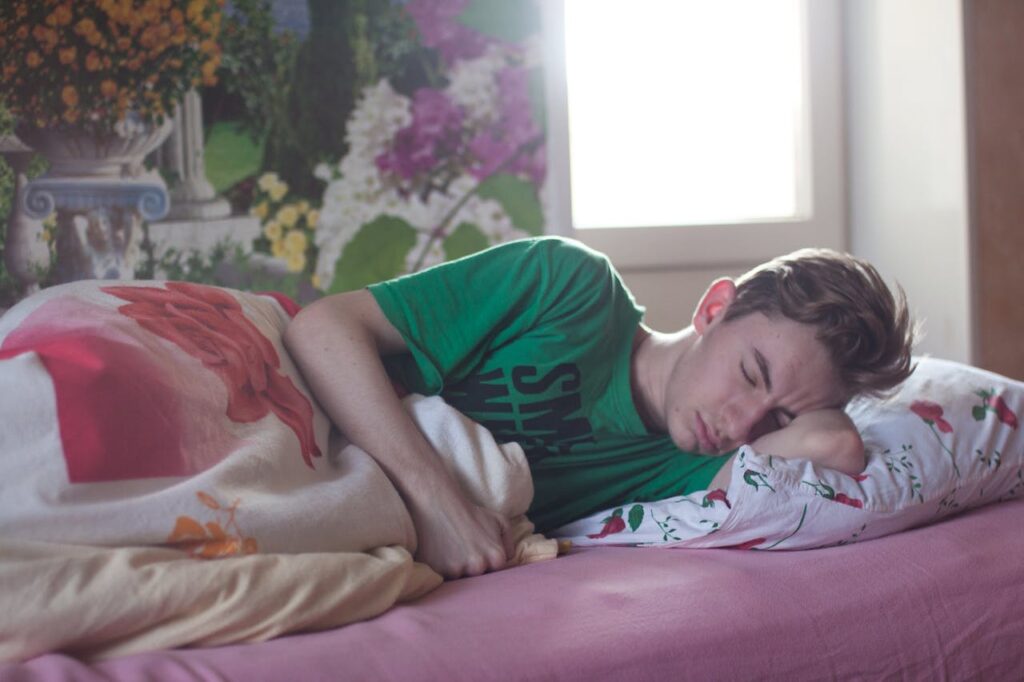According to a study, while obtaining adequate sleep is associated with better mental health, it has no bearing on a person’s stress-reduction strategies. Image sourced from Studio Firma/Stocksy.
Prolonged stress may increase the risk of two mental illnesses: anxiety and sorrow.
The results of a recent study indicate that sleep and adaptive emotion regulation strategies have a significant role in reducing the likelihood of anxiety and depression in those who experience high levels of ongoing stress.
The COVID-19 pandemic, which left people under a great quantity of continuous stress, was used in this investigation. Management of chronic stress is crucial, regardless of the source.
Many people went through an extended period of stress because to the unique circumstances brought about by the COVID-19 pandemic. Researchers are attempting to determine what factors lead to improvements in mental health as well as how these protracted, chronic stressors affect mental illness.
The journal Cortex published a study that examined the connections between positive coping methods, or adaptive emotion regulation approaches, and rates of anxiety, depression, and poor sleep.
The study conducted by the authors indicates that both components are helpful in reducing rates of anxiety and sadness. They found that the effectiveness of emotion management approaches was unaffected by the quality of sleep, which was contrary to their initial hypothesis.
What role does sleep quality play?
This study was a secondary analysis of sleep and mental health data collected during the COVID-19 pandemic in 2020, from spring to fall.
The main objective of the study was to determine whether adaptive emotion management strategies are associated with better mental health.
Adaptive cognitive emotion management approaches are cognitive processes that have the potential to improve mental health over the long run. The practice of “positive reappraisal,” which is the process of looking for the positive aspects of a situation or occurrence, serves as one example.

Secondly, they tried to find out if adaptive emotion management approaches worked better or worse depending on the quality of sleep. In view of “the COVID-19 pandemic, a naturally-occurring and chronic stressor,” they looked at these factors.
Co-author of the study Emma Sullivan gave a summary of the investigation’s primary goals to Medical News Today:
Our first line of investigation during the COVID-19 pandemic was whether a higher frequency of positive coping strategies would be associated with a reduction in feelings of depression and anxiety. Second, we sought to determine whether the benefits of developing healthy coping mechanisms to reduce depressive and anxious symptoms depended on one’s ability to have restful sleep. This is because studies have connected symptoms of anxiety and depression with restful sleep and the use of healthy coping strategies.
Emotional intelligence tactics are essential.
The study included 1,600 adult participants. The participants provided essential demographic data via online forms. They also responded to questionnaires that asked questions on generalised anxiety, depression, and coping mechanisms.

Based on data analysis, the researchers found that a higher use of adaptive cognitive emotion management strategies was associated with lower evaluations of anxiety and depression.
Additionally, they found a link between claims of higher-quality sleep and lower anxiety and sadness ratings.
They found that people who claimed to sleep better also employed more flexible cognitive emotion management strategies. This study focused on the relationship between adaptive cognitive emotion control strategies and the quality of sleep.
In their final model, which included sleep quality, adopting adaptive cognitive emotion control methods did not significantly predict anxiety outcomes.
Stated differently, it appears that there is no relationship between the effectiveness of positive coping methods in reducing feelings of melancholy and anxiety and the quality of a person’s sleep. Positive regulation techniques maintained to show advantages for mental health, independent of sleep quality.
Sullivan explained to MNT the subtleties of these results:
In fact, we found that a decrease in sensations of anxiety and hopelessness was associated with a higher frequency of use of constructive coping techniques. Additionally, better-quality sleep was associated with fewer depressive and anxious feelings. However, in contrast to what we had anticipated, acquiring healthy coping strategies to reduce the symptoms of depression and anxiety did not necessitate having lots of good sleep.
The findings are not as startling as they initially seem.
Dr. Lindsay Oberleitner, a licenced clinical psychologist and SimplePractice’s director of education, gave MNT some insight into the study’s conclusions. She wasn’t working on the study.
She told us that, “interestingly, in their relationship to depression and anxiety, cognitive emotion regulation techniques and sleep quality didn’t work together as was expected.”
But she did note that this might not be as surprising as it would seem at first.
If we stand back from the present probe, this may not come as a major surprise. It is common knowledge that every individual’s experience of anxiety and hopelessness is influenced by a multitude of complex factors. Sleep and other physical health factors affect mental health, and emotion management strategies go beyond simple cognitive adaptation.
Lindsay Oberleitner, M.D. Research limitations and more analysis
Nevertheless, it is critical to acknowledge the limitations of this study. Researchers relied participant self-reporting, which isn’t often trustworthy.
They draw attention to the fact that reports of sleep quality typically correspond poorly with measures. Since they could only look at the adaptive cognitive emotion management technique and sleep quality once during the study, they were unable to evaluate any changes that might have occurred.
Furthermore, there was more data on melancholy than anxiety in the authors’ dataset. The study lacked sufficient power to assess any small potential interaction effects.
Because of the limits of the measurements they used, they were unable to look at the relationship between the best cognitive emotion management technique or combination of techniques and sleep quality.
The study’s main participants were white girls in their higher education levels in the United States. Since the data was collected online, several variables could not be considered. All these limitations limit the study’s conclusions to a wide interpretation and highlight the need for more diverse future research.
Lastly, the study’s authors observe that it is difficult to extrapolate the findings of this study to other prolonged stressors and their consequent consequences on mental health because the COVID-19 pandemic provided a unique source of stress.
According to Sullivan, future research might look into additional stressors.
“Replicating these findings in the face of other long-term stressful events would be good, as the COVID-19 pandemic was obviously a unique stressful situation,” she said to MNT.
Furthermore, she went on, “it might be crucial to investigate in the future the relationships between particular mechanisms and symptoms of depression and anxiety as well as sleep quality, since we examined a variety of constructive coping mechanisms.” Positive reappraisal, which means reassessing the situation in a constructive way, and perspective-taking, which requires taking the larger picture into account, are two examples of this.


